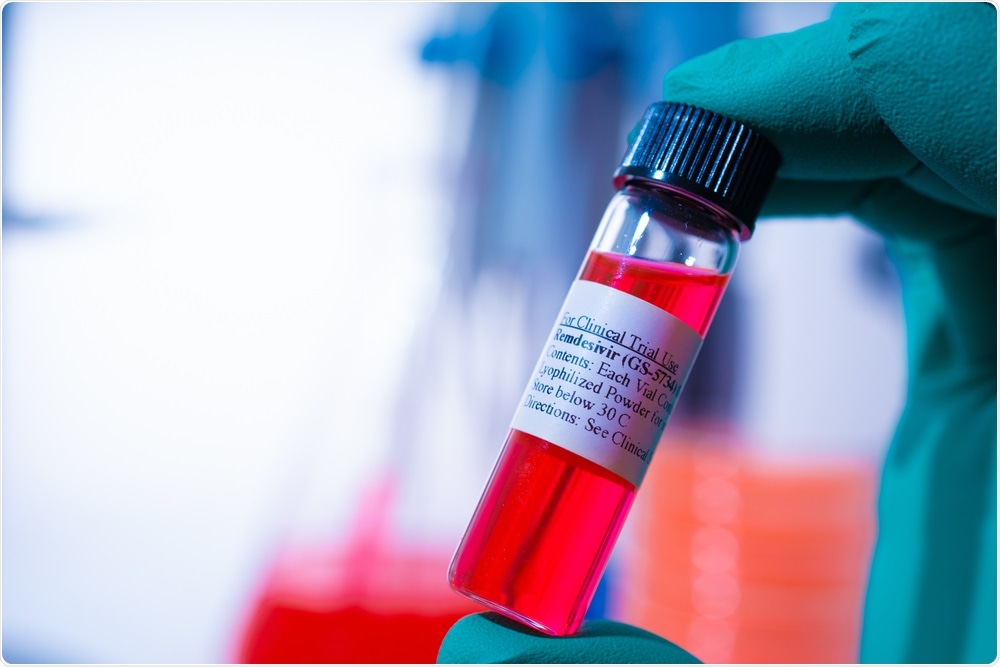5-day Remdesivir dose works as well as the 10-day dose in COVID-19, study finds
by Angela Betsaida B. Laguipo, BSNA team of researchers in the United States conducted a randomized, open-label, phase 3 trial involving hospitalized patients who tested positive to SARS-CoV-2 infection. They aimed to determine the difference between administering remdesivir to coronavirus-infected patients for five days and ten days.

Study: Remdesivir for 5 or 10 Days in Patients with Severe Covid-19. Image Credit: science photo / Shutterstock
What is Remdesivir?
Remdesivir is an RNA polymerase inhibitor with potent antiviral activity in vitro and efficacy in animal models of coronavirus disease (COVID-19).
Initially, the drug was used as a potential treatment for the Ebola virus, which caused an outbreak in 2014. Health officials rolled out the use of the drug in many parts of Africa. The drug also showed promising results in preventing infections such as the Middle East respiratory syndrome (MERS-CoV) and severe acute respiratory syndrome (SARS) in animal studies.
How does it work?
Remdesivir is a member of one of the most important classes of drugs, called nucleoside analog. At present, there are more than 30 of these drugs that were approved to treat viruses, parasites, cancers, and bacterial infections.
The drug works by stopping or interrupting viral replication, which stops the virus from multiplying and infecting more cells in the body. In the case of the coronavirus infection, the drug works by blocking the RNA polymerase, which is one of the vital enzymes that the virus needs to replicate its genetic material and multiply in the body.
The dosage of the drug is through daily infusion for about ten days. At present, the drug has not been approved by health officials across the globe. Further, the drug was initially being used for Ebola, making the supply low. Many countries attempt to get access to the drug in the hopes of treating their COVID-19 patients.
Comparing two doses
The research team wanted to compare the effects of two doses of remdesivir, the 5-day dose, and the 10-day dose. They conducted the trial on hospitalized patients with COVID-19 and had radiologic evidence of pneumonia. Patients were randomly assigned to receive intravenous remdesivir for either five days or ten days.
All of the patients were given 200 mg of remdesivir on the first day, and 100 mg once daily on the following days. On day 14, the team assessed the clinical status of the patients.
The study, published in the New England Journal of Medicine, found there is no significant difference between those who were treated with the antiviral drug for five days versus ten days.
One of the study authors, Dr. Francisco Marty, an infectious diseases physician at Brigham and Women’s Hospital, said that shorter treatment is better because it would mean that the estimated supply of the drug can be doubled.
Since there is a lack of drug supply, giving a patient half the recommended dose at the same efficacy level can help treat more people.
“In patients with severe COVID-19 not requiring mechanical ventilation, our trial did not show a significant difference between a 5-day course and a 10-day course of remdesivir. With no placebo control, however, the magnitude of benefit cannot be determined,” they added.“Our trial suggests that if remdesivir truly is an active agent, supplies that are likely to be limited can be conserved with shorter durations of therapy,” the team wrote in the paper.
They emphasize that the trial has no placebo control and cannot be used to measure the drug’s effectiveness.
However, Marty said that the study findings could help guide other studies in the future. Also, it can support previous studies about remdesivir, just like the preliminary results from an ongoing clinical trial by the National Institute of Allergy and Infectious Diseases.
Journal reference:
- Goldman, J., David, M.P.D., Lye, C.B, Marty, F. et al. (2020). Remdesivir for 5 or 10 Days in Patients with Severe Covid-19. New England Journal of Medicine. https://www.nejm.org/doi/full/10.1056/NEJMoa2015301